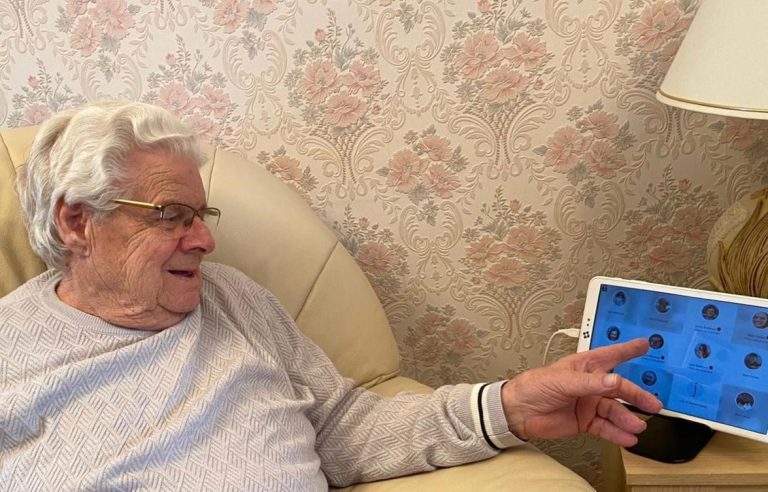
Hassle-free video calling from Alcove and Vodafone UK is helping tech-averse and vulnerable people lead independent and connected lives.
Video calling has helped all of us stay in touch during lockdown. But it can seem out of reach for many people unfamiliar with the technology or who have difficulty using standard off-the-shelf devices.
Hellen Bowey, founder of care company Alcove, is on a mission to make this vital face-to-face contact available to all, whether they’re elderly, infirm or living with a disability.
Ms Bowey was motivated to set up Alcove by her mother’s background as an informal carer. Existing telecare technology – usually involving some kind of alert button or pull-cord system – was “basic and ugly”, she says.
“Growing older doesn’t have to mean being cooped up in your flat with a big red button round your neck worrying that no-one will come to help if you have a fall.
“And you can’t press a red button when you’re passed out on the floor anyway,” Ms Bowey told VodafoneUKNews.
———————————————————————————————————————————-
———————————————————————————————————————————-
Alcove has developed a Video Carephone, a specially adapted tablet device designed to make video calling as simple and straightforward as possible. The 4G connectivity provided by Vodafone UK is a crucial element of this vision. With no Wi-Fi passwords to forget or routers to configure, users can make video calls just by touching a person’s photo on the screen.

The specially adapted tablet devices are designed to be very easy to use
Robert (last name withheld) said: “I love the sociability that the Video Carephone gives me. I have not been able to see my grandkids due to the coronavirus or meet up with my chums so it has helped me to stay in touch with everyone. The best part is that I don’t need log-ons or codes to be able to see or speak to people.”
The Carephone isn’t just for video calling, however; it can also remind people to take medication or regular exercise.
“I like the idea that it can prompt me to move every hour to prevent me getting sores and to keep doing my exercises,” said Robert.
We are all about empowerment
(Hellen Bowey, Alcove)
For people who aren’t independently mobile, the face-to-face communication provided by the Alcove Video Carephone can be of even greater value. For example, a carer for Mrs O (real names withheld) said: “During one of her night episodes Mrs O was thinking of self-harming and she rang her daughter on the Carephone who managed to talk her down.
“It allowed her family to see her and to be able to calm her. This would have been difficult without the device.”
Thousands of people have received Alcove Video Carephones equipped with Vodafone SIMs since lockdown began. Most were supplied through local councils, care providers or NHS care packages following individual risk and care assessments.
More data, better care
The Video Carephone is one part of Alcove’s broader system of connected devices and Internet of Things (IoT) sensors.
The data collected by motion sensors installed throughout someone’s home, or by a wearable device such as a smartwatch, can be accessed in real-time by loved ones and carers on their smartphones or laptops through Alcove’s bespoke system.
Unusual behaviours or breaks in regular patterns, such as someone staying in one place for longer than normal or becoming unusually active in the middle of the night, say, will generate an alert.
And Alcove has ambitious plans to make that data even more useful. It is working on an algorithm that could predict whether someone is likely to become lonely or depressed, or someone living with dementia is likely to wander off outside their home.
Ms Bowey emphasises that the algorithm and its development will be fully compliant with the European Union’s General Data Protection Regulation (GDPR) privacy rules.
It’s all a far cry from the red button alarms and pull cords that she found so primitive.
Even before the era of social distancing and shielding, Vodafone UK has long recognised that technology can be vital in combating loneliness and isolation, from raising awareness of the issue to providing connectivity and technological expertise to charities and other care experts.
Helping people lead lives that are as independent and fulfilling as possible is a goal Vodafone and Alcove share.
As Hellen Bowey puts it: “We are all about empowerment”.









